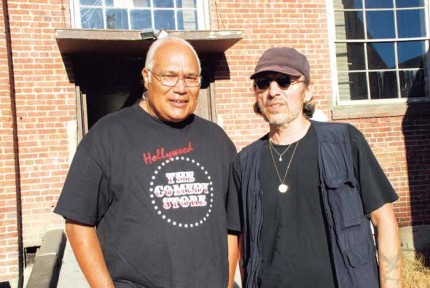No one can claim that John Trudell led a charmed life. His was an interesting life and he lived it well. How many people have had a song written about them while in the prime of their lives. Who of us has been described as “extremely eloquent, and therefore very dangerous”?
I met Trudell in Los Angeles while working on the documentary Reel Injun. It was the morning after Barack Obama was first elected in November 2008. The crew and I were having a meal of Vietnamese takeout at a studio run by an Apache. Trudell appeared early all of a sudden. He was a slight man, dressed in jeans, t-shirt and vest with sunglasses, looking like the rock star he was.
After a rushed meal I asked if he wanted to go out for a smoke. We sat in a shade making small talk. I told him how much I liked Baby Boom Che, his song about Elvis Presley. I asked him about his thoughts about the previous night’s election. “It doesn’t matter who they elect, the system’s not going to change” was all he had to say. Just before our interview I asked him if he could take off the glasses. He refused, stating, “You don’t want to look into these eyes.”
Trudell was born in Omaha, Nebraska, on February 15, 1946. He grew up near the Santee Sioux reservation. He enlisted in the US Navy at 17 and served on a frigate off the coast of Vietnam. After his discharge, he studied radio and communication at a community college in San Bernardino. In 1969, he became the spokesperson of the United Indians of All Tribes’ occupation of Alcatraz Island in the San Francisco Bay, helping run the group’s Radio Free Alcatraz. It was there that he gained international attention as one of the most eloquent voices from Indian Country.
A few years later, Trudell joined the American Indian Movement, and soon after, became its national chairman from 1973 to 1979. Trudell burned the US flag on the steps of the FBI building in Washington, DC, during a protest in 1979. The following night, on the Shoshone-Paiute reservation in Nevada, his home burned to the ground with his pregnant wife, three children and mother-in-law trapped inside. Only his father-in-law survived the blaze. Many claimed that the suspicious fire was an attempt to silence him.

Charlie Hill & John Trudell
His friend Kris Kristofferson sang of Trudell in the 1995 song Johnny Lobo:
In a darkened corner of a tavern
Burning down old memories again
Johnny Lobo stares into the smoke and dream of clouds
Running like wild horses with the wind
Holy phoenix rising from the ashes
Into the circle of the sun
Johnny Lobo’s warrior heart was burnished in the embers
And the battle’s just begun
After the loss of his family, Trudell wandered through the US and Canada with a friend. He started writing poetry. “They’re called poems,” he said, “but they’re not. They’re lines for me to hang on to.”
Soon after he started working with Kiowa guitarist Jesse Ed Davis on a series of albums. The second was AKA Grafitti Man (1992), which Bob Dylan hailed as the best album of the year, playing it before his audiences while on a tour. Trudell went on to release many more records. One of them, Bone Days (2001), was produced by a certain Angelina Jolie, the daughter of Trudell’s then partner, Marcheline Bertrand.
Throughout this time Trudell remained active, speaking at events regarding Indigenous rights, the nuclear industry and the environment. He also appeared in several films – as the radio deejay in Smoke Signals (“It’s a good day to be Indigenous…”) and the militant fugitive in Thunderheart. He was also the subject of the 2005 documentary Trudell.
Trudell came out with three books of his “lines” from 1982 to 2008, the last titled Lines From a Mined Mind.
Kris Kristofferson wrote about another friend, Johnny Cash, in the song The Pilgrim, and its lyrics ring true about Trudell:
He’s a poet, oh, he’s a picker,
he’s a prophet, he’s a pusher,
he’s a pilgrim and a preacher,
and a problem when he’s stoned,
he’s a walkin’ contradiction,
partly truth, partly fiction…
Trudell was called a militant, poet, warrior, artist, philosopher and prophet by scores of people. One thing he was never called was a walking contradiction, partly truth and partly fiction.
Trudell was a fiery and brutally honest speaker. His eloquent and dangerous voice fell silent on December 8, 2015 at his home in Santa Clara County, California.

